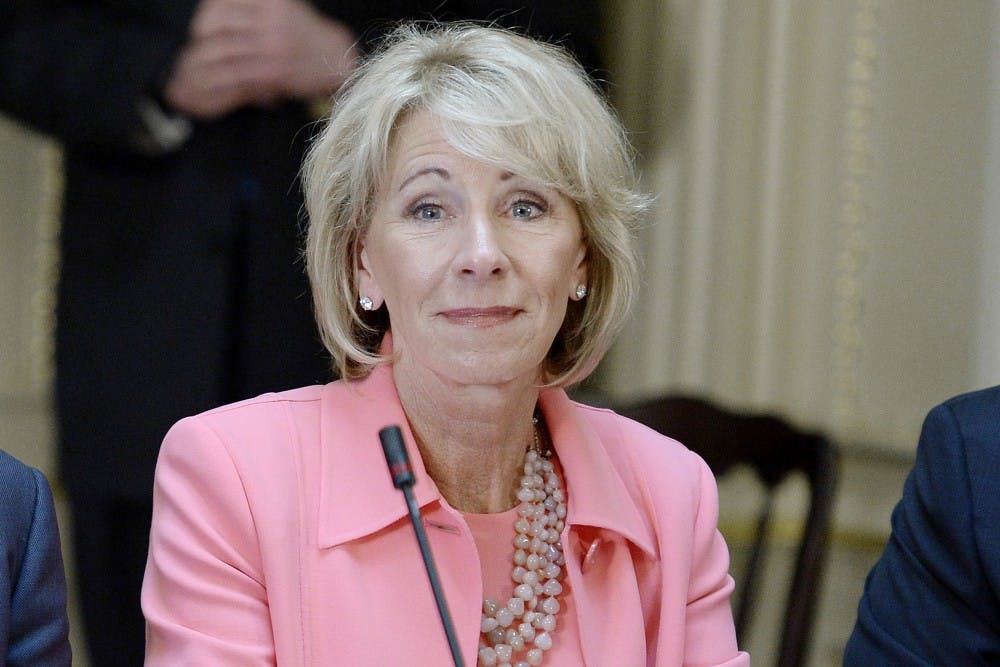The way universities investigate sexual assault could be changing. Secretary of Education Betsy DeVos announced the first steps in replacing federal guidance that suggests how universities like IU should respond to student reports of sexual assault.
DeVos' announcement came Thursday afternoon in a George Mason University speech that was streamed live on the Department of Education’s Facebook page. In her speech, DeVos said her department would begin a public notice and comment period seeking alternatives to Obama-era Title IX guidance that, she said, “comes far too short for far too many students.”
Title IX, which broadly states that no person should face discrimination on a basis of sex, requires every university to have systems in place to address reports of sexual assault. The Department of Education has provided further frameworks for how universities can meet these requirements through guidance letters issued by the department’s Office of Civil Rights.
DeVos came out strongly against this guidance today, repeatedly referencing the “failed system” it has created at universities across the country. She said these guidelines have become elaborate and confusing, difficult even for lawyers to understand.
“There must be a better way forward,” DeVos said.
This guidance has become highly controversial in recent years. Lawyers argue that it gives schools the ability to conduct ad hoc trials in which university officials untrained in the legal profession serve as the judge, jury and executioner for sexual misconduct cases carrying heavy consequences for students.
In her speech, DeVos discussed this characterization of university sexual misconduct systems. She outlined a stark picture of hearing processes in which students are denied due process rights, only to receive them by suing their own university.
She pointed to what she sees as faults in these systems, including students being denied adequate knowledge of charges brought against them, and those same students being made to play the role of a lawyer in their own defense in schools’ judicial conferences.
DeVos called the practice shameful and wholly un-American.
“Survivors, victims of a lack of due process and campus administrators have all told me that the current approach does a disservice to everyone involved,” DeVos said. "That’s why we must do better, because the current approach isn’t working.”
In her speech, DeVos provided examples from students and parents she consulted with in a series of listening sessions convened by the Department of Education last July. She noted the story of a student who became suicidal after his involvement in a sexual misconduct report, and of another student whose alleged rapist walked free after first being found responsible in a university hearing and then winning a lawsuit in response to that university’s treatment of his case.
“We need to remember we are not just talking about faceless cases,” DeVos said. “We are talking about people’s lives.”
She suggested universities look to organizations like the American Bar Association and the American College of Trial Lawyers that have studied this issue and provided their own guidance on how to better navigate sexual misconduct reporting.
DeVos outlined one specific suggestion for how these cases could be better handled. Rather than conducting their own investigations, she said schools should be allowed to opt in to a regional partnership in which professionally trained experts, working with states and their attorneys general, investigate reports of a criminal level with the help of law enforcement.
“This model allows educators to focus on what they do best — educate,” DeVos said.
IU released a statement Thursday afternoon in response to DeVos' comments reiterating its commitment to addressing issues of sexual violence.
"We will continue to respond to all reports of possible sexual misconduct by offering and providing support and resources to those who need it, by objectively and thoroughly investigating reports and by conducting any related proceedings in a manner that assures due process, as well as fairness and dignity to all participants," the statement read.
It also stated that IU will assess its own policies to ensure compliance with federal law and would participate in any changes to come to federal guidance to "assure protections for victims and fairness to all."
Comments to DeVos’ press conference on the Department of Education’s Facebook live video have been overwhelmingly negative. Many fear changes in the department's stance on sexual violence cases will discourage students from reporting.
Trust in the department's understanding of campus rape was beleaguered when Candice Jackson, the acting head of the department's Office of Civil Rights, was quoted in a July New York Times article saying, "Rather, the accusations — 90 percent of them — fall into the category of 'we were both drunk,' 'we broke up, and six months later I found myself under a Title IX investigation because she just decided that our last sleeping together was not quite right.'"
Jackson later publicly apologized for the comments that outraged victims' rights advocates, calling them "flippant."
DeVos made it clear in her speech Thursday that acts of sexual violence are not to be tolerated at university campuses.
She said the goal of the announced notice and comment period was to elicit public feedback and transparency for a system she feels has far too long failed students.
“No one benefits from a system that doesn’t have the public’s trust,” DeVos said.
Carley Lanich






